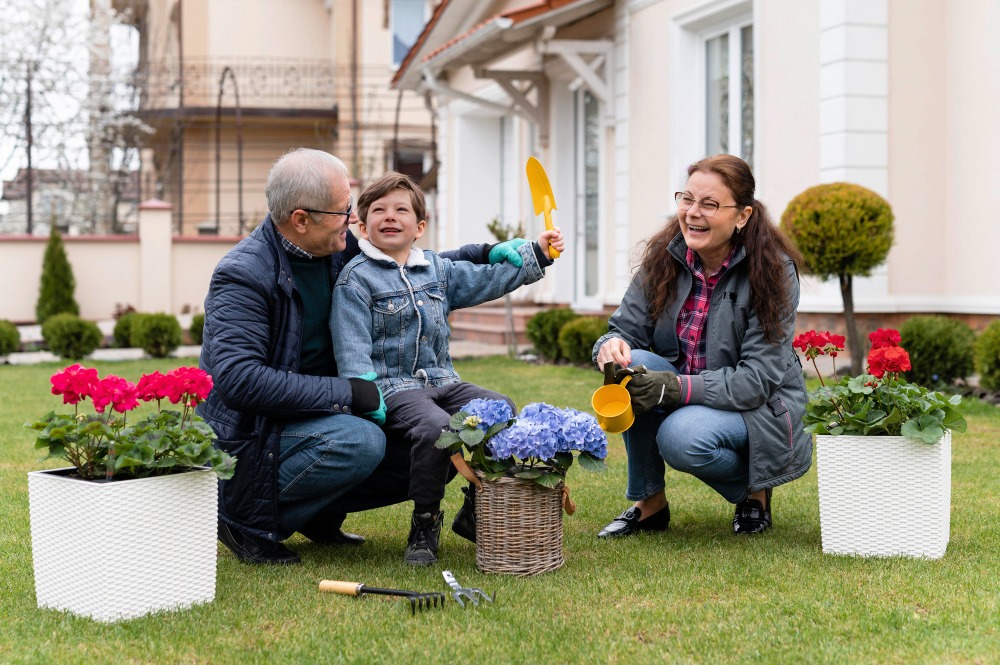Gardening can be an incredibly fulfilling and beneficial activity for seniors. As individuals age, nurturing a garden can provide a sense of purpose and joy, along with numerous physical and mental health benefits. From cultivating vibrant flowers to growing fresh produce, the act of tending to a garden can significantly contribute to seniors’ overall well-being and quality of life. In this comprehensive guide, we’ll delve into the nuances of garden care tailored specifically for seniors, offering valuable insights and tips for creating a flourishing garden space that brings both joy and therapeutic benefits.
As individuals age, it becomes increasingly essential to focus on activities that promote physical activity, mental well-being, and a sense of fulfillment. Gardening, in this context, emerges as a highly recommended and rewarding pursuit for seniors. The act of nurturing a garden not only provides a source of gentle exercise but also offers a therapeutic outlet for reducing stress and enhancing overall mood.
Table of Contents
- Importance of Gardening for Seniors
- Choosing the Right Plants
- Accessible Garden Design
- Creating Raised Beds for Ease
- Essential Gardening Tools for Seniors
- Adaptive Techniques for Garden Care
- Seasonal Garden Care Tips
- Watering Techniques for Seniors’ Gardens
- Managing Pests and Weeds
- Maintaining Soil Health
- Importance of Sunlight and Shade
- Tips for Enjoying the Garden Safely
- Building Community Gardens for Seniors
- Budget-Friendly Gardening Tips
- Therapeutic Benefits of Gardening for Seniors
- Cultivating Plants for Mental Well-being
- Growing Vegetables and Herbs
- Choosing Low-Maintenance Plants
- Sustainable Gardening Practices
- Gardening Activities for Socialization
- Combining Gardening with Physical Exercise
- Celebrating Achievements in Gardening
- Conclusion
Importance of Gardening for Seniors
Gardening holds multifaceted significance for seniors, encompassing physical, mental, and emotional benefits. Engaging in gardening activities can contribute to increased physical activity, improved dexterity, enhanced hand strength, and better overall flexibility.
Choosing the Right Plants
Selecting the appropriate plants is crucial to ensure that gardening remains an enjoyable and sustainable activity for seniors. Opting for low-maintenance plants that require minimal care can significantly reduce the workload while ensuring a flourishing garden.
Accessible Garden Design
Creating an accessible garden design is paramount to enable seniors to maneuver through the garden space with ease. Implementing raised beds, wider pathways, and strategically placed seating areas can make the garden more accessible and user-friendly for elderly garden enthusiasts.
Creating Raised Beds for Ease
Raised beds offer a practical solution for seniors, eliminating the need to bend or kneel excessively while tending to plants. The elevated nature of raised beds provides easier access for planting, watering, and weeding, thus reducing strain on the back and knees.
Essential Gardening Tools for Seniors
Equipping oneself with the right gardening tools can make a substantial difference in the overall gardening experience for seniors. Lightweight, ergonomically designed tools with easy-grip handles can enhance comfort and efficiency during gardening tasks.
Adaptive Techniques for Garden Care
Implementing adaptive techniques and tools tailored for senior gardeners can significantly simplify the process of garden care. Leveraging tools such as kneelers, long-handled tools, and specialized gloves can alleviate physical strain and enable seniors to engage in gardening comfortably.
Seasonal Garden Care Tips
Adhering to seasonal garden care tips is essential to maintain a thriving garden throughout the year. Understanding the specific requirements of plants during different seasons can help seniors ensure that their garden remains vibrant and healthy.
Watering Techniques for Seniors’ Gardens
Establishing appropriate watering techniques is crucial to ensure that plants receive adequate hydration without overexerting seniors. Utilizing lightweight watering cans, drip irrigation systems, or soaker hoses can simplify the process of watering, making it more manageable for elderly gardeners.
Managing Pests and Weeds
Effectively managing pests and weeds is a critical aspect of maintaining a healthy garden. Implementing organic pest control methods and employing mulching techniques can help seniors protect their plants from harmful pests and invasive weeds without relying on harsh chemicals.
Maintaining Soil Health
Nurturing a garden involves paying close attention to the quality of the soil. Seniors can maintain soil health by incorporating organic matter, compost, and mulch, fostering a nutrient-rich environment that supports plant growth and vitality.
Learn More: Protecting Older Adults from the Heat
Importance of Sunlight and Shade
Understanding the importance of sunlight and shade is fundamental in ensuring that plants receive adequate light exposure for optimal growth. Positioning plants strategically based on their sunlight requirements can contribute to a thriving garden ecosystem for senior gardeners.
Tips for Enjoying the Garden Safely
Prioritizing safety measures while gardening is essential to prevent any accidents or injuries. Seniors can ensure a safe gardening experience by wearing appropriate protective gear, maintaining a well-lit garden space, and avoiding overexertion during gardening activities.
Building Community Gardens for Seniors
Establishing community gardens specifically tailored for seniors can foster a sense of belonging and camaraderie among individuals. Community gardening initiatives provide an excellent platform for seniors to socialize, share gardening tips, and collectively enjoy the therapeutic benefits of nurturing a garden.
Learn More: Benefits of Elderly Living at Home
Budget-Friendly Gardening Tips
Engaging in budget-friendly gardening practices can be highly beneficial for seniors looking to manage their gardening expenses effectively. Implementing strategies such as seed-saving, composting, and utilizing recycled materials can significantly reduce the overall costs associated with gardening.
Therapeutic Benefits of Gardening for Seniors
Gardening offers a plethora of therapeutic benefits for seniors, promoting relaxation, stress reduction, and overall emotional well-being. The sensory experience of nurturing plants and witnessing their growth can evoke feelings of accomplishment and contentment among senior gardeners.
Cultivating Plants for Mental Well-being
Cultivating specific plants known for their calming and soothing properties can contribute to improved mental well-being for seniors. Incorporating aromatic herbs, colorful flowers, and plants with textured foliage can create a serene and tranquil garden environment that promotes relaxation and mindfulness.
Learn More: Outdoor Games for Seniors
Growing Vegetables and Herbs
Growing vegetables and herbs can be an enriching experience for seniors, allowing them to enjoy the fruits of their labor while embracing a healthier lifestyle. Cultivating a diverse range of vegetables and herbs can encourage seniors to incorporate fresh and nutritious produce into their daily diet.
Choosing Low-Maintenance Plants
Opting for low-maintenance plants can simplify the gardening process for seniors, particularly those with limited mobility or energy. Selecting plants that are resilient, drought-tolerant, and disease-resistant can ensure a flourishing garden with minimal effort.
Sustainable Gardening Practices
Adopting sustainable gardening practices is essential in preserving the environment and minimizing the ecological footprint of gardening activities. Seniors can contribute to environmental conservation by practicing water conservation, utilizing organic fertilizers, and promoting biodiversity within their garden space.
Gardening Activities for Socialization
Engaging in group gardening activities can foster social interaction and create a sense of community among seniors. Participating in communal gardening sessions, workshops, or horticultural therapy programs can provide an opportunity for seniors to bond over their shared love for gardening.
Learn More: How to Brighten the Holidays for Seniors
Combining Gardening with Physical Exercise
Incorporating gardening activities that double as physical exercise can promote overall physical well-being for seniors. Tasks such as digging, planting, and weeding can serve as low-impact exercises, contributing to improved muscle strength, joint flexibility, and overall cardiovascular health.
Celebrating Achievements in Gardening
Acknowledging and celebrating the achievements and progress made in the garden can instill a sense of pride and accomplishment among senior gardeners. Reflecting on successful harvests, blooming flowers, and overall garden transformations can serve as a source of motivation and encouragement to continue nurturing the garden with passion and dedication.
Conclusion
Gardening serves as an enriching and therapeutic activity for seniors, fostering a connection with nature while promoting physical, mental, and emotional well-being. By implementing the recommended garden care tips and strategies tailored for seniors, individuals can create a vibrant and nurturing garden space that not only brings joy and fulfillment but also contributes to a healthier and more active lifestyle. Embracing the joys of gardening can truly enhance the overall quality of life for seniors, fostering a sense of purpose, accomplishment, and community within the realm of nature.







